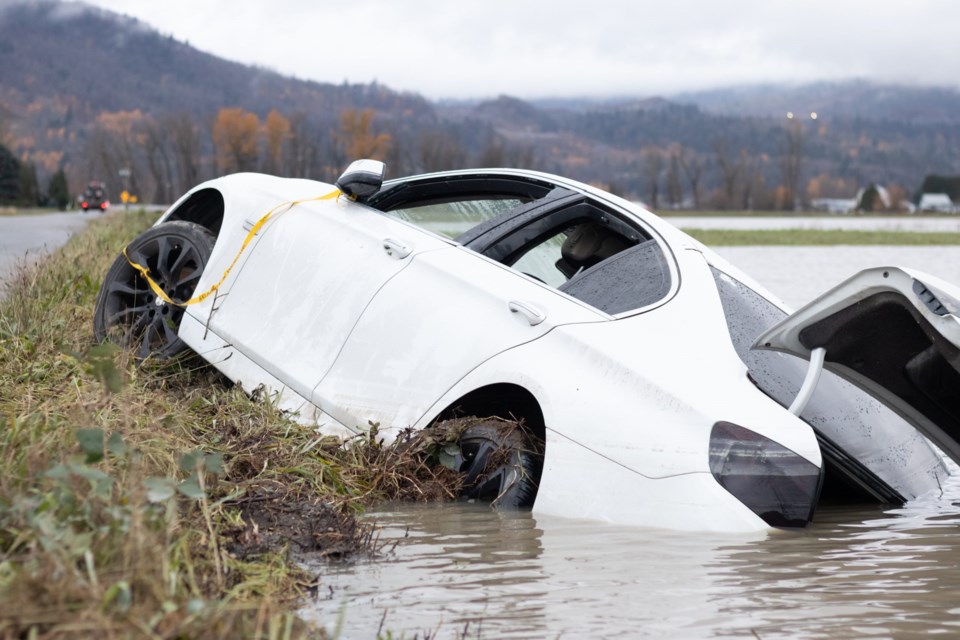The BC government has so far mostly shrugged off criticism about its slow response to damaging floods, but it was dealt a direct blow by an angry Metro Vancouver regional government this week that threatens to upend its carefully-managed narrative.
The Fraser Valley Regional District blasted the province for failing to quickly respond to its urgent pleas for funding and assistance, including $1.5 million to shore up Othello Road on the Coquihalla River near Hope.
By the time the government responded, five days later, it was too late, according to chairman Jason Lum.
“By then the road was gone, so were the houses,” Lum said in a statement.
The Fraser Valley Regional District includes some of the hardest-hit areas in recent storms, including Abbotsford. But it mainly serves the rural and remote communities, while larger municipalities like Abbotsford and Chilliwack take on their own emergency response with well-funded resources.
In another case, Lum said regional firefighters have been working “around the clock” to help evacuate and assist people in the flooding. The district applied for $30,000 from Emergency Management BC to compensate the volunteer firefighters for 10 straight days of work.
“That request was denied,” said Lum. “It’s an insult to those volunteers who are out risking their lives for their neighbour.”
The sharp criticism caught the BC government off guard.
It had so far been able to brush aside complaints that its system of emergency response, which relies heavily on local governments to take the lead, was cumbersome and slow, by pointing repeatedly to the “unprecedented” rainfall that defied expectations.
But the Fraser Valley Regional District criticism was not as easily batted away. These were examples of the disconnect between a province that expects local governments to act, and then ties them up with cumbersome red tape, delays, and bureaucracy when they need help paying for extraordinary expenses.
“We’ve been working communities rights across the province to ensure they are getting the resources and funding they need, and we have seen numerous examples as to how that’s been working,” said Farnworth on Wednesday, in response to questions about the dispute.
“I understand the concern raised by the regional district director… I can also tell you local government does have authority to undertake emergency repairs, they do not have to get the approval of the province to rent or to get a backhoe.”
But that wasn’t the issue, and Lum had already been out in the media proactively shredding that reply.
“If we don’t get those funds approved from the province, there simply is no pot of money to draw upon to do them,” he said of the regional finances.
Farnworth tried instead to pivot to government’s successes.
“My staff are working with and reaching out to the Fraser Valley Regional District,” he said.
“I can tell you this, there have been 36 requests for financing that have been approved between Nov. 15 and Nov. 30.”
But it took 35 minutes and four questions from reporters for Farnworth to get around to the actual issue - and in the process he admitted the district was correct in at least one of its criticism.
“I do know that in terms of the one around the firefighters that one is being re-assessed,” he said.
He also admitted six other requests from the district for funding “were not accepted” but did not elaborate.
Lum no doubt found himself in the doghouse with EMBC officials and the minister’s office for speaking publicly about gaps in the system. But he did not appear to care, having had to watch homes crushed by rivers and oversee emergency rescues.
“I want to go to bed every night thinking I’ve done every possible thing that we can to get people help,” he told CBC News. “And if it means speeding the process up, and if it means we have to ruffle some feathers and point out gaps in the process, then so be it.”
BC’s emergency system requires local governments to take the lead in responding, declaring local emergencies and asking the province for help. It’s complicated, and has both its critics and defenders. Some suggest the province should take the lead in a province-wide emergency, like the recent floods. Others, including many local government leaders, do not want to give up local control of emergency response to a provincial bureaucracy because they know their communities best and how to respond.
Farnworth has said the whole structure will be reviewed and updated next spring.
In the meantime, the voices of local leaders who find gaps in the system should be listened to very closely.
“Part of leading this response we've been asked to do is point out gaps and challenges where we find them,” Lum told CBC.
“What I'm trying to do here is identify some gaps in response so I don’t have to tell somebody that their home is going to be lost. Our electoral area directors are desperately standing with residents as they literally have to watch their homes fall and get swallowed up in the river.
“So if we can do better, if we can make these processes quicker and less bureaucratic than I think it behoves us to do that.”
Rob Shaw has spent more than 13 years covering BC politics, now reporting for CHEK News and writing for The Orca. He is the co-author of the national best-selling book A Matter of Confidence, and a regular guest on CBC Radio.



